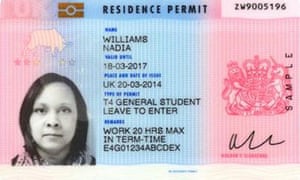 Brexit Britain will be home to 3 million second-class European Union “settled citizens” who have been fingerprinted, registered and issued with a residence identity document and with no vote in general elections.
Brexit Britain will be home to 3 million second-class European Union “settled citizens” who have been fingerprinted, registered and issued with a residence identity document and with no vote in general elections.
That is the “between the lines” message of the British government’s offer on EU citizens’ rights after Brexit. The 3 million EU nationals will be joining the ranks of at least 1 million foreign nationals from outside the EU with “indefinite leave to remain” status who already form a largely invisible disenfranchised subclass in Britain. The fact is that Brexit is going to change the face of Britain in ways that perhaps were not fully debated during the
referendum campaign. At heart the EU citizens’ rights package means that once again for the first time in 40 years foreigners start at Calais.
The mandatory requirement for every EU national who has lived in Britain for five years to apply for “settled status” and to register for a “residence document” amounts essentially to an ID card system. It doesn’t necessarily need literally to be an identity card, although that is a possibility being considered. It could just be an entry on a Home Office database if that is built in time.
But whatever form this new residence permit finally takes, settled EU nationals will need to produce it if they are to get a job, to use the health service, rent private accommodation, open a bank account or apply for a driving licence.
The current biometric residence card for non-EU nationals looks remarkably like an identity card. It has a photograph on it. It is plastic debit card sized. It includes a chip with the holder’s digital photographs and fingerprints. It doesn’t have to be carried all the time but must be produced alongside a passport when entering and leaving Britain and accessing public services and jobs.
This discussion of a possible ID card scheme for EU nationals makes for uncomfortable reading for the Brexit secretary, David Davis, who made his principled fight against Labour’s ID card schemes a central part of his political career even to the extent of resigning to fight a 2008 byelection on the single issue of the erosion of civil liberties.
Davis insisted on Monday that the proposed mandatory registration of EU nationals after Brexit did not amount to an ID card scheme because they won’t have to carry them around all the time. “It is not an ID card. We are talking about documentation to prove that people have the right to a job and the right to residence, but they will not have to carry that around all the time. It is not an ID card; it is rather like your birth certificate. It’s not an ID card! Good heavens!” he told MPs.
But then, Labour’s ID schemes were never going to give the police the power to demand “papers please” either.
When the 2008 Davis resigned his post as shadow home secretary in protest at the growth of the “database state” under Gordon Brown he presciently observed: “It is typical of this government to kickstart their misguided and intrusive ID scheme with students and foreigners – those who have no choice but to accept the cards – and it marks the introduction of compulsory ID cards for all by stealth.”
The 2017 Davis resists this interpretation and might point to the fact that many British citizens living in European countries already have to register for residents’ cards. But that is because ID cards are used across the board in nearly all EU countries with UK, Ireland and Denmark the notable exceptions.
No comments:
Post a Comment